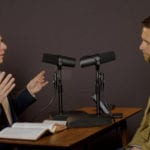Tim R. from Lafayette, Louisiana:
What does Peter mean when he writes that God rescued a righteous Lot, who was greatly distressed by the sensual conduct of the wicked (2 Pet. 2:7)? How does this square with what we read in Genesis 19?
We asked for a response from Chris Bruno (PhD, Wheaton College), academic dean for the Antioch School Hawaii and a pastor for Harbor Church in Honolulu.
I have to confess that 2 Peter 2:7 has always perplexed me. When you read Genesis 19 and the account of God’s judgment on Sodom and Gomorrah, there is not a whole lot that would lead you to think that “righteous Lot” was “greatly distressed by the sensual conduct of the wicked,” as Peter puts it.
In Genesis 19, Lot is living in Sodom with seemingly little trouble sleeping at night. As many commentators point out, he was sitting at the city gate (Gen 19:1), which indicates that he had some level of influence in the city. While there is certainly nothing wrong with gaining influence in a city full of sinners (in fact, we should aim to do this more today), nothing in the text indicates that Lot was working to reform the city for the kingdom of God.
Also, while he does insist on showing the strangers who had come to visit hospitality, he also offers his virgin daughters in place of his neighbors’ lustful demands to sleep with the strangers. Beyond this, Lot’s daughters get him drunk so he can father his own grandsons in the last part of the chapter. I don’t think we can sweep any of this under the rug very easily. So, at least in Genesis 19, the evidence certainly leans against seeing Lot as righteous. Then how can Peter call him “Righteous Lot”?
I think the key to this puzzle is found in Genesis 19:29: “So it was that, when God destroyed the cities of the valley, God remembered Abraham and sent Lot out of the midst of the overthrow when he overthrew the cities in which Lot had lived.”
When we connect the dots, we discover that Lot was righteous because of the gospel. In Genesis 15:6, we find that Abraham believed God and this was counted to him as righteousness. That is to say, Abraham was justified by faith and, as we see in Genesis 12-17, the Abrahamic covenant is a testimony to justification by faith. Paul seems to say as much in Romans 4 and Galatians 3.
So then, when Genesis 19:29 says “God remembered Abraham,” I think we might have a clue on the way to figuring out how Lot was in fact righteous. I don’t think we can say that when God remembered Abraham, Abraham’s righteousness through faith was imputed to Lot. Rather, God remembering Abraham refers to at least two things: First, Abraham was indeed righteous through faith, and found favor with God. Because of this, Lot’s rescue was in some sense for the benefit of Abraham. It was clearly an answer to Abraham’s prayers in Gen 18:22-33.
But that still does not explain 2 Peter 2:7. In fact, Peter goes on to say that Lot was tormented “over their lawless deeds that he saw and heard” (2 Pet 2:8). So, on the basis of 2 Peter, we must conclude that there is more than simply God’s favor to Abraham at work in Genesis 19. I think that when God remembered Abraham, he was not just remembering Abraham as an individual. So then, the second way that God remembered Abraham was by remembering the covenant with Abraham and the promise that, as Paul puts it, all those of faith are the sons of Abraham (Galatians 3:9).
So then how was Lot righteous? Lot was righteous in the same way that you and I are righteous—-by trusting in the God of Abraham. God remembered Abraham (Gen 19:29), whose faith was counted to him as righteousness (Gen 15:6). The only biblically consistent answer to the question of how Lot was righteous (2 Pet 2:7) is that he, like Abraham, believed God. Lot was righteous not because he acted perfectly in the incident with the two strangers in Genesis 19—-far from it. But we know from Peter that he was troubled by the sin he saw around him day after day.
I’d suggest what we need to do is read the Bible canonically in this situation. We can see in Genesis 19:29 that God’s faithfulness to the Abrahamic covenant was the deciding factor in Lot’s rescue. We know that, according to Genesis 15:6, God justifies, or makes righteous, those who have faith in his promises. So then, we can infer Lot’s righteous status from Genesis. As a consequence of this, we can assume that, just as Abraham’s obedience in the sacrifice of Isaac in Genesis 22 was a result of his righteous status, Lot’s righteousness should also lead to obedience. Genesis leaves us wondering whether and how this might have happened.
But 2 Peter 2 confirms that Lot was indeed righteous and fills out how this righteous status affected him. He was troubled by the sin he saw around him in Sodom. However, this was not the foundation of his righteousness, but rather the result of it. Both his righteousness and ours, as 2 Peter 1:1 reminds us, is finally and fully predicated on the righteousness of our God and Savior Jesus Christ.
It seems that the only way to affirm both the account in Genesis 19 and the teaching of 2 Peter 2 is to read both in concert. And when we are reading these texts canonically and Christologically, the pieces fit together in such a way that they can only lead to one conclusion: Lot was simultaneously righteous and sinful.
And more often than I’d like to admit, I act like Lot did. I am indeed troubled by the sin I see around me in the world. But far too often, I end up responding to the sin I see around me the same way that Lot did—-by sinning myself. My guess is that many Christians share this experience.
But like Lot, I have also been declared righteous. Not because of what I have done, but because of what Christ has done for me. And at the end of days, I will be proclaimed righteous because I have been united to the true Righteous One. No person is proclaimed righteous apart from Christ, but all who are in him are declared righteous along with him. This is how Lot could be righteous even in the midst of his sin. So then, 2 Peter 2:7 is a testament to the audaciousness of the gospel—-Peter could call a man with so many obvious flaws Righteous Lot because of the promise to Abraham. And if we are in Christ, then God has rescued us as well because he remembers his promise to Abraham.


































